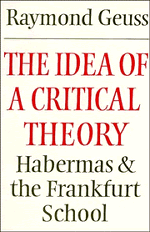Recognition and Power
The topic of recognition has come to occupy a central place in debates in social and political theory. Developed by George Herbert Mead and Charles Taylor, it has been given expression in the program for Critical Theory developed by Axel Honneth in his book The Struggle for Recognition. Honneth's research program offers an empirically insightful way of reflecting on emancipatory struggles for greater justice and a powerful theoretical tool for generating a conception of justice and the good that enables the normative evaluation of such struggles. This 2007 volume offers a critical clarification and evaluation of this research program, particularly its relationship to the other major development in critical social and political theory; namely, the focus on power as formative of practical identities (or forms of subjectivity) proposed by Michel Foucault and developed by theorists such as Judith Butler, James Tully, and Iris Marion Young.
- A broad discussion of the work of Axel Honneth by leading philosophers and social theorists
- Honneth confronts how a morality of recognition can avoid complicity with ideologically laden standards of mutual expectation
- Leading theorists such as Robert Pippin, Iris Marion Young, and Rainer Forst present their views, as well as their critique of Honneth's work
Product details
December 2010Paperback
9780521184380
414 pages
229 × 152 × 23 mm
0.6kg
Available
Table of Contents
- 1. Introduction Bert van den Brink and David Owen
- Part I. Philosophical Approaches to Recognition:
- 2. Analyzing recognition: identification, acknowledgment and recognitive attitudes towards persons Heikki Ikaheimo and Arto Laitinen
- 3. Recognition and reconciliation: actualized agency in Hegel's jena phenomenology Robert Pippin
- 4. Damaged life: power and recognition in Adorno's ethics Bert van den Brink
- 5. The potential and the actual: Mead, Honneth, and the 'I' Patchen Markell
- Part II. Recognition and Power in Social Theory:
- 6. Work, recognition, emancipation Beate Roessler
- 7. '… that all members should be loved in the same way…' Lior Barshack
- 8. Recognition of love's labor: considering Axel Honneth's feminism Iris Marion Young
- Part III. Recognition and Power in Political Theory:
- 9. 'To tolerate means to insult': toleration, recognition, and emancipation
- 10. Misrecognition, power, and democracy Veit Bader
- 11. Reasonable deliberation, constructive power, and the struggle for recognition Anthony Simon Laden
- 12. Self-government and 'democracy as reflexive co-operation': reflection on Honneth's social and political ideal David Owen
- Part IV. Axel Honneth on Recognition and Power:
- 13. Recognition as ideology Axel Honneth
- 14. Rejoinder Axel Honneth.






